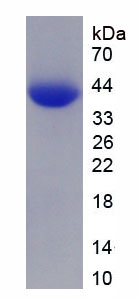Recombinant D-Amino Acid Oxidase (DAO) 

DAMOX
Overview
Properties
- Product No.RPJ298Hu01
- Organism SpeciesHomo sapiens (Human) Same name, Different species.
-
Applications
Positive Control; Immunogen; SDS-PAGE; WB.
If bio-activity of the protein is needed, please check active protein.
Research use only - DownloadInstruction Manual
- CategoryEnzyme & Kinase
- Source Prokaryotic expression, Host E.coli
- Endotoxin Level<1.0EU per 1µg (determined by the LAL method)
- Subcellular LocationSecreted
- Molecular Mass 43.2kDa, Accurate 43kDa(Analysis of differences refer to the manual)
- Residues & TagsMet1~Leu347 with N-terminal His Tag
- Buffer FormulationPBS, pH7.4, containing 0.01% SKL, 5% Trehalose.
- Traits Freeze-dried powder, Purity > 90%
- Isoelectric Point6.8
Share your citation
Upload your experimental result
Review
Leave a message
Loading...
Sign into your account
Share a new citation as an author
Upload your experimental result
Review
Please attach serial No. on instruction manual


Contact us
Please fill in the blank.
Name*
Organization
Address
E-mail address*
Telephone
Inquiry*
Verification code*

Sequence

Usage
Reconstitute in 10mM PBS (pH7.4) to a concentration of 0.1-1.0 mg/mL. Do not vortex.
Storage
Avoid repeated freeze/thaw cycles. Store at 2-8°C for one month. Aliquot and store at -80°C for 12 months.
Stability
The thermal stability is described by the loss rate. The loss rate was determined by accelerated thermal degradation test, that is, incubate the protein at 37°C for 48h, and no obvious degradation and precipitation were observed. The loss rate is less than 5% within the expiration date under appropriate storage condition.
Increment services
-
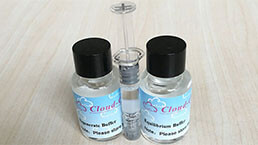 Endotoxin Removal Kit
Endotoxin Removal Kit
-
 BCA Protein Quantification Kit
BCA Protein Quantification Kit
-
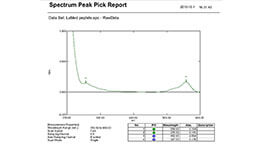 Protein Labeling Customized Service
Protein Labeling Customized Service
-
 Molecular Mass Marker for Protein
Molecular Mass Marker for Protein
-
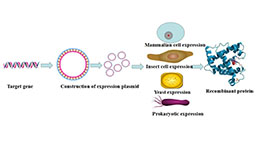 Recombinant Protein Customized Service
Recombinant Protein Customized Service
-
 Monoclonal Antibody Customized Service
Monoclonal Antibody Customized Service
-
 Polyclonal Antibody Customized Service
Polyclonal Antibody Customized Service
-
 Protein Activity Test Experiment Service
Protein Activity Test Experiment Service
-
 Immunoprecipitation (IP) Experiment Service
Immunoprecipitation (IP) Experiment Service
-
 Buffer
Buffer
-
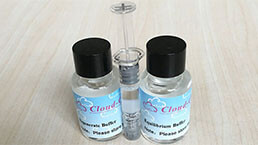 Endotoxin Removal Kit II
Endotoxin Removal Kit II
-
 Real Time PCR Experimental Service
Real Time PCR Experimental Service
-
 Spike RBD Protein (S-RBD)
Spike RBD Protein (S-RBD)
-
 Protein G
Protein G
-
 Protein A
Protein A
Citations
- Differential regulation of D-amino acid oxidase (DAO) mRNA and protein expression in human post-mortem brainDam: Jcr:3107E495-Ef68-4692-85Be-D43D9F3F84Ff
- Age span expression of schizophrenia susceptibility genes D-amino acid oxidase (DAO) and DAO activator (DAOA) in human post-mortem braindam:jcr:c3394762-a692-4fbd-8a37-7da14f429996
- Expression of D-Amino Acid Oxidase (DAO/DAAO) and D-Amino Acid Oxidase Activator (DAOA/G72) during Development and Aging in the Human Post-mortem Brain.pubmed:28428746
- Noninvasive biomarkers of gut barrier function identify two subtypes of patients suffering from diarrhoea predominant-IBS: a case-control studyPubmed: 30400824
- Gut microbiota dysbiosis worsens the severity of acute pancreatitis in patients and micePubmed: 30519748
- Effect of a chamomile extract in protecting against radiation‐induced intestinal mucositisPubmed: 30632234
- Role of Aquaporin-3 in Intestinal Injury Induced by SepsisPubmed: 31582652
- Hydrogen attenuates radiation-induced intestinal damage by reducing oxidative stress and inflammatory responsePubmed: 32361189
- Effect of Lactobacillus casei on lipid metabolism and intestinal microflora in patients with alcoholic liver injury33514869
- The Relationship between Low Serum Vitamin D Levels and Altered Intestinal Barrier Function in Patients with IBS Diarrhoea Undergoing a Long-Term Low-FODMAP33801020
- The ¦Á2AR/Caveolin©\1/p38MAPK/NF©\¦ÊB axis explains dexmedetomidine protection against lung injury following intestinal ischaemia©\reperfusion34114328
- Somatization in patients with predominant diarrhoea irritable bowel syndrome: the role of the intestinal barrier function and integrity34022802
- Psychological and Gastrointestinal Symptoms of Patients with Irritable Bowel Syndrome Undergoing a Low-FODMAP Diet: The Role of the Intestinal Barrier34371976
- Blood D-amino acid oxidase (DAO) levels increased with cognitive decline among people with mild cognitive impairment (MCI): a two-year prospective studyPubmed:35430632





